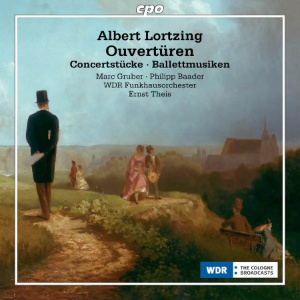
Albert Lortzing (1801-1851)
Overtures, Concert Pieces, Ballet Music
Marc Gruber (horn), Philipp Baader (trumpet)
WDR Funkhausorchester/Ernst Theis
rec. 2023, WDR Klaus-von-Bismarck-Saal, Cologne, Germany
cpo 555 626-2 [83]
Surprisingly now, Albert Lortzing was among the best one hundred composers in a pocket music dictionary I had when I was twelve. I suspect it was because his opera Zar und Zimmermann, and especially the overture, was often heard. That overture in not here, but there are five others, unknown to this reviewer, plus ballet music and two concert pieces. Overall, this is an excellent portrait of this once popular actor and composer.
The style reminds one of Franz von Suppé and Daniel Auber, Lortzing’s contemporaries. Undoubtedly, he had a special talent and, as an actor, an intimate knowledge of what worked on the stage. This is particularly noticeable in the ballet music from operas, although there cannot be full appreciation without the visual evidence. There are four dances from Undine and an elegant series in the much longer set of diverting extracts from Hans Sachs. Apparently, this included a passage danced by puppets.
Lortzing’s first successes when he worked at a theatre in Detmold in 1826-1832 were in vaudeville, as Der Pole und sein kind [the Pole and his child] where he also played a leading role. In the overture, a rather pedestrian affair, Lortzing used foreign melodies, including a song which a hundred years later would be adopted as the Polish national anthem.
Lortzing seems to have been particularly proud of the overture to the play Yelva for which he also composed the incidental music. It is exciting and surely reminiscent of Weber at his most fiery, perhaps Euryanthe.
We read that, remarkably, Lortzing composed an opera practically every year once he landed in Leipzig. He often wrote his own libretti; the first was Die beiden Schützen [The Two Riflemen], an amazing achievement. His businessman brain told him that clearly he should regard overtures as important in promoting his operas hopefully beyond Leipzig. He kept them succinct and memorable. He learned from his regular work with the city orchestra and became a good orchestrator. For example, the overture to Rolands Knappen begins with atmospheric high string tremolandi that soon turn into a brisk sonata form allegro with a stirring ending.
Perhaps Lortzing took his concertante works more seriously. Irmild Capelle, the booklet writer, may well think so, as she comments in some detail about both pieces here. The composer called them Konzertstücke. He wrote the piece for trumpet when he was just nineteen. It is a set of, I think, five variations and a cadenza on a tune from The Marriage of Pumpernickel, a sort of Singspiel which Matthäus Stegmayer (1771-1820) wrote in 1818. It might have been a tribute to that composer.
Lortzing described his Konzertstück for horn and orchestra as a pot-pourri. He took themes from popular operas of the time by Auber and François-Adrien Boieldieu, and wrote variants on them. He composed the piece for the leading horn player in the orchestra in Detmold.
One can describe much of what we have on this disc as easy listening, but I would not say that it is primarily for a niche market. The programme represents the sort of thing happening in Europe outside the world of Beethoven, Mendelssohn and Schumann. Conductor Ernst Theis takes it seriously, as do the eloquent soloists. They all bring colour and character to every piece, and hoover off the mothballs sadly accumulated over two hundred years.
Gary Higginson
Buying this recording via a link below generates revenue for MWI, which helps the site remain free


Contents
Overture to Casanova (1841)
Ballet music from Undine (1845)
Overture to Die beiden Schüzen (1837)
Concert Piece for horn and orchestra in E major (1831)
Overture to Der Pole und sein kind (1831)
Ballet music from Hans Sachs (1840)
Overture to Rolands Knappen (1849)
Concert Piece for trumpet and orchestra in B flat major (1820)
Overture to Eugène Scribe’s play Yelva (1832)
















